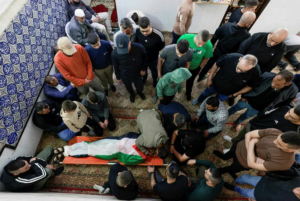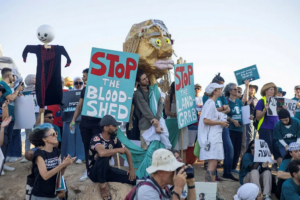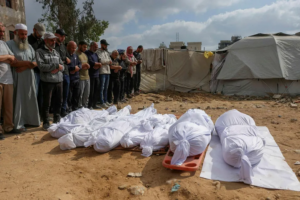Joint Israeli-Palestinian Memorial Day ceremony dares to defy the cycle of a bloody reality

Mourners mourn next to the body of 42-year-old Palestinian Hussein Hardan during his funeral in Jenin, April 2025
Nir Hasson and Sheren Falah Saab report in Haaretz on 29 April 2025:
Israeli and Palestinian bereavement circles are separate entities that never meet. Each side is immersed in its own grief, wants it to be theirs and theirs alone, and blames the other for its tragedies.
In the past year and a half, these circles have grown enormously bigger, with tens of thousands of Palestinian and Israeli dead. Mutual hatred, violence and feelings of revenge have grown, too, and have taken over the hearts of everyone from the river to the sea.
Two organizations, the Parents Circle-Families Forum and Combatants for Peace, have sought to go against the flow and are committed to bringing together victims on both sides of the conflict. On Tuesday evening, the two groups will be meeting for the 20th annual conference at an undisclosed location to prevent participants from being harassed.
Despite the rising violence, and perhaps because of it, scores of Israelis and Palestinians have joined the Forum this year. Many of them are newly bereaved, having lost loved ones since October 7, 2023, including those who lost dozens of family members in Gaza, the parents of soldiers who have fallen in battle and the families of murdered people.
Others who had suffered losses long ago decided, in the face of the bloody reality, to go against the grain and join the Forum.
F., who was born in Gaza and today lives in the West Bank, joined Combatants for Peace years ago. Her mother supported her decision. “She said to me, ‘It’s the right way. Today, we’re a minority who believe in the way of peace, but in a few years, they’ll know you were right,” says F. When the war broke out, her mother was forced to leave her home in Gaza and move to a camp for the displaced in an empty school building.
“In one of our conversations, she told me, ‘Tell the Israelis to stop the bombing, to just shoot us and be done with it, because bombings turn us into pieces and lacerated cadavers,'” she said. Last October, she spoke to her mother for the last time. “She said that she was tired of the situation, the evacuations, the lack of privacy, the lack of food and water. She cried a lot during that conversation, which made me very sad. She was in a lot of mental pain and suffering because of the death around her. She simply told me, ‘I want it to stop.'” A few hours later, her mother was shot dead by a sniper as she left the school compound.
Despite the pain, and perhaps because of it, F. continued working with Combatants for Peace. “Palestinians and Israelis will have to live together,” she declares, “No one is going anywhere. This must be internalized and understood – we must learn to live together. All we ask for is our rights as Palestinians and the freedom to live without barriers and without fear,” she said.
“For me, Combatants for Peace is my second home, like my parents. My presence there is important precisely because of the war. This is my platform to speak about the suffering of the Palestinians in Gaza,” she added. “All the people dear to my heart – my nephews, my sisters – are all in Gaza, and I fear that something will happen to them. I speak and act on their behalf as well. It’s a complex situation. My mother was killed by Israelis, and those who comfort me following her death [are] also Israelis who have apologized for it,” F. said. “It just shows that not everyone’s the same and not everyone is in favor of killing and war.”

Combatants for Peace activists in a protest near Jericho in 2024
Liora Ayalon of Kibbutz Kfar Azza lost her son Tal, the commander of the kibbutz’s emergency squad, on October 7. She and the rest of her family were rescued after 35 hours in the safe room. “I was a peace activist before October 7 and I’m still a peace activist,” she said. After her son’s death, she joined the Forum without hesitation, and since then, she has felt firsthand the government’s hostility toward the group. “I came to speak to students in Jerusalem. Two Education Ministry inspectors were sitting in the audience and writing down everything I said to prove that we are an anti-Israeli organization. My son was killed in the battle for Kfar Azza, we were in a safe room for 35 hours, and they are writing down every word to prove that I’m anti-Israel,” she said. “I felt like I was being followed. The students asked questions, and I felt like I was weighing words because the inspectors were writing down every word.”
On her way out of the lecture, the ministry officials asked for her ID number. Ayalon refused. A week later, they appeared again at her lecture, this time at a school in Tel Aviv. Over the past few years, the Education Ministry has been taking every possible step to ban the organization from schools.
“The Forum defies the assumption that there’s no one to talk to. Here, there is someone to talk to. That scares them and presents a very big problem,” Ayalon said. “The word ‘peace’ has been made illegitimate inside the education system. I admit I exploit the privilege I have as a bereaved mother to say things that no one else dares to say.”
Khuloud, a resident of the West Bank city of Jenin, joined the Forum three years ago, a few months after her son was killed by Israeli army fire. “Those around me were surprised by what I did,” she said. “I was asked why I did it and how I got the courage. Not everyone accepts my decision with understanding. But I, as the mother of a son who was killed, see that it is the right thing to do.” “Even during my first meeting with Israelis and Palestinians, I spoke out loud about my pain, and I told them, ‘In Israel, [even] a dog has the right to move freely and live a better life than us,'” Khuloud said. “I had four children. Now, I only have two; one was killed and another was arrested. And despite everything, I’m against wars and against killing, and see that the right way is dialogue and understanding with Israelis. There’s no other way,” she said in a choked voice and in tears.
Since its launch, Combatants for Peace’s Memorial Day ceremony has been a target for threats and even violence by right-wing activists. The ceremony peaked at Memorial Day in 2023, before the war. 15,000 people attended, and it was considered, at the time, to be another extension of the anti-government protests. Two hundred Palestinians also attended, only coming after the High Court of Justice forced the government to allow them entry to Israel.

Palestinians pray by the bodies of members of the Abou Mahadi family, killed in Israeli strikes on the family home in Beit Lahia in northern Gaza on 28 April 2025
The events of October 7 and the subsequent war in Gaza again drove a wedge between Israelis and Palestinians, who returned to focus on their own pain and anger.
Last year, after the outbreak of the war, the ceremony was held without Palestinians, because they were not allowed to enter Israel, and it was filmed in advance for fear of attacks.
This year, the ceremony will resume its live format, but the organizers decided to avoid disclosing its location to prevent right-wing activists from assaulting attendees. It will be held simultaneously in Beit Jala in the West Bank for the Palestinian participants and broadcast directly to dozens of locations in Israel.
Tareq, a 29-year-old activist with Combatants for Peace from the West Bank city of Jericho, will also attend the ceremony. His aunt and her family live in Gaza. “It always pains me that Gaza’s dead are only referred to as numbers, and I had many questions: Who eulogizes them? Is there enough room to bury them all? How is it possible to continue killing without anyone saying anything?” he said.
“My aunt and her whole extended family – the children, daughters, grandchildren – are living in one house. They explained that they prefer to be together and not apart, so that if the area where they’re living is bombed, they’ll die together, so they won’t have to deal with the loss. It’s a lot harder for those who remain alive, because they’ll have their whole lives to suffer the death. That’s their solution.”
“There is opposition on both sides to comparing the bereavement, because they’re not willing to recognize the other side’s loss,” said Combatants for Peace director Ayelet Harel. Harel’s brother, Yuval, was killed in the First Lebanon War. Harel also said that Israelis often object to the ceremony being held on the same day as Israel’s Memorial Day for Israel’s Fallen Soldiers and Victims of Terrorism. “We think that that is the day when we must act to stop the cycle of blood.”
“Precisely in this difficult year, when the war and bloodshed cast a shadow over our lives, the importance of continuing [our activity] increases,” said Combatants for Peace director Eszter Korani. “In the moments when it is easy to be swept into despair and hate, we choose to believe.”
“We are told here, ‘How can you participate in such an organization with soldiers’ families,’ and they are told there [in Israel], ‘How can you participate in such an organization with families of terrorists’,” says Combatants for Peace member Mohammed al-Bau from Halhul in the West Bank, who lost his brother in the Second Intifada. “It has always been hard, and this year is harder than ever. Here as well, when you say the word ‘peace’, they laugh at you. It’s very hard, but you have to go on.”
M. from Betlehem joined Combatants for Peace after losing 20 relatives in several incidents in Gaza. “They lived in Jabalya. The house was destroyed and they moved to Nuseirat. But life there is very hard. They have no food, no water, no power. I have a cousin who was killed with his three children. “I joined [Combatants for Peace] because there is no point in killing and no point in wars. We’ve been killing since 1948. The time has come to stop,” he added.
Khuloud buried her son next to the house. “I open the window and I see my son’s grave. I have other children and I must persist for them,” she said in tears. “My participation in Combatants for Peace helps me cope with the pain. I look forward to the meetings where the other side, the Israelis, will hear what we’re going through. At the last meeting, my 16-year-old son, the youngest, joined me. He’s been depressed, sad, since his brother was killed,” she said.
“He doesn’t leave the house. It really hurts me to see him like that. He had a very special relationship with his brother. It’s important for me that he opens up and talks about his personal pain before everyone, and to see that the Israeli side has people who oppose the killing and the conditions in which we live.”
This article is reproduced in its entirety
